Women for Peace. Member Spotlight: Emily Miki
Emilia (Emily) Epeti Miki is the Founder and CEO of the Denis Miki Foundation and Efeti Ventures working in Limbé, Cameroon. She holds a Bachelor of Science degree in Nursing from the University of Buea, Cameroon and Master’s in International Relations option International Communication and Public Action, from the International Relations Institute of Cameroon (IRIC), Cameroon. Her expertise has developed over the years and she focuses primarily on female involvement in peace processes and dialogue, mentorship, and community development in underserved and remote areas of Cameroon.
Beginning an International Career
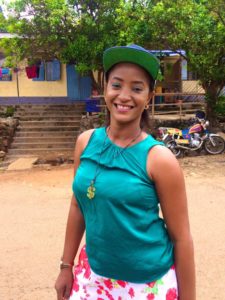
By the will of her mother (who wanted her to be a Medical Doctor) and following regular norms of having 5 A’Levels in the Sciences in Cameroon, Emily reluctantly started her academic career in life sciences to become a nurse. “I still felt like this was not me.” She felt like there was something more that she should be doing and quickly realized that she was not enjoying the clinical studies. While participating in her Clinical Placement as part of the requirements for a BSc in Nursing at CHU and Chantal Biya’s Foundation in Yaoundé she discovered the International Relations Institute of Cameroon and felt right at home. She quickly adapted to the world of international relations theory, comparative politics, human rights, and learning about international organizations such as the World Health Organization (WHO) and others. At the same time, she ambitiously started her own foundation: The Denis Miki Foundation. In addition to development, her NGO finds financial resources for scholarships and health insurance projects for girls and women.
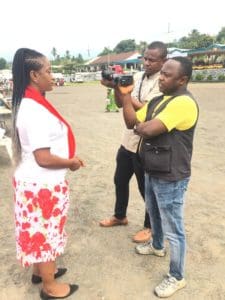 After 2016, most development projects in Cameroon which were in rural areas became very difficult due to lack of access to these communities which could not be easily reached. This was due to ongoing conflict in the South West and North West regions of the country. Emily saw this as the opportune time for civil society to get involved. She became a member of the South West and North West Women Task Force (SNWOT) and decide that she wanted to learn more about peacebuilding. In 2017, she was selected for the Mandela Washington Fellowship, 2018 for the Obama Foundation Africa Leaders program and in 2019 for the Hiroshima Global Peacebuilders Program in Japan.
After 2016, most development projects in Cameroon which were in rural areas became very difficult due to lack of access to these communities which could not be easily reached. This was due to ongoing conflict in the South West and North West regions of the country. Emily saw this as the opportune time for civil society to get involved. She became a member of the South West and North West Women Task Force (SNWOT) and decide that she wanted to learn more about peacebuilding. In 2017, she was selected for the Mandela Washington Fellowship, 2018 for the Obama Foundation Africa Leaders program and in 2019 for the Hiroshima Global Peacebuilders Program in Japan.
Due to the ongoing conflict and the government silencing journalists and community groups, Emily had to focus on delivering different community projects on human rights, digital rights, digital safety, and physical protection. They could not do more community development projects at that time as people were being silenced and forbidden to gather in groups.
Overcoming Sexism, Resistance and Stigma
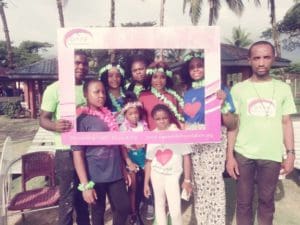 After being selected for her first international program, Emily’s family, friends, and community were surprised that she was going to America and even more surprised that once the project had finished, that she would return to her community. Priests, family, friends, and everyone was mocking her for returning back to Cameroon and not staying in the USA. “People lose a lot of money to travel abroad. The fact that I came back provided me with other opportunities, such as going to Ethiopia for the YALI Connecting Camp alumni project with my Mentee. People were still not sure yet, it took many years to generate the impact that I am now creating.” Another major issue she came up against was asking people for donations to fund her community projects and workshops, “It’s difficult to get people to donate because in Cameroon we don’t have a donating culture,” she explained.
After being selected for her first international program, Emily’s family, friends, and community were surprised that she was going to America and even more surprised that once the project had finished, that she would return to her community. Priests, family, friends, and everyone was mocking her for returning back to Cameroon and not staying in the USA. “People lose a lot of money to travel abroad. The fact that I came back provided me with other opportunities, such as going to Ethiopia for the YALI Connecting Camp alumni project with my Mentee. People were still not sure yet, it took many years to generate the impact that I am now creating.” Another major issue she came up against was asking people for donations to fund her community projects and workshops, “It’s difficult to get people to donate because in Cameroon we don’t have a donating culture,” she explained.
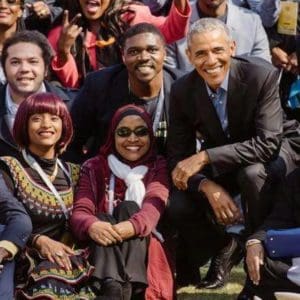 Many people did not understand that their donation could provide support to someone or alleviate their problems. Her success even took her to meet former US President Obama. “The opportunities kept coming, but many people would say a young girl cannot be so successful. Usually, organizations are led by elderly people and have lots of money.” Through all the criticism, she never let it stop her in achieving her goals or implementing the projects she was working on. She knew that her success had come from hard work, commitment and dedication.
Many people did not understand that their donation could provide support to someone or alleviate their problems. Her success even took her to meet former US President Obama. “The opportunities kept coming, but many people would say a young girl cannot be so successful. Usually, organizations are led by elderly people and have lots of money.” Through all the criticism, she never let it stop her in achieving her goals or implementing the projects she was working on. She knew that her success had come from hard work, commitment and dedication.
“People don’t look at the efforts that you put in, getting into those really remote communities, taking the risk, giving up my future. But then I gave up everything so that I could find solutions to people’s own problems, implement community development projects and solve community problems. So That sacrifice is also a very huge one. But then I left it all so that I could do something that I am passionate about. That has an impact at the grassroots level, so I am not just working with those people that make those decisions, as I also try to make an influence on the decision making processes, and ensure that the people at the grassroots are getting the change, giving them hope, working with them and solving their problems directly too,” she said determinedly.
Women for Peace
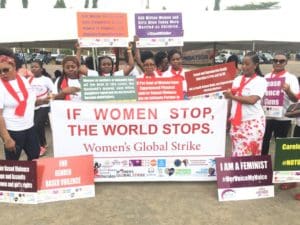
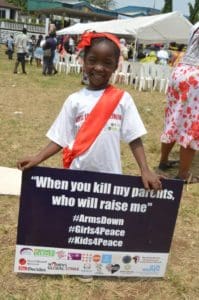 Presently, Emily is preparing summer boot camps for girls and preparing to launch a “Women for Peace Movement” and a “Girls for Peace” campaign, where women and girls can campaign for female involvement in peacebuilding. This is an important issue as historically, not very many women have been represented in peace processes. Women are not included in peace processes and she is going to try to push the notion that women need to be part of peacebuilding projects. “If we leave women and don’t include them in the process, we are lacking something,” she stated. In addition to the upcoming camps, her foundation also has a mentorship project on teaching others to start organizations and businesses, as well as women mentorship programs.
Presently, Emily is preparing summer boot camps for girls and preparing to launch a “Women for Peace Movement” and a “Girls for Peace” campaign, where women and girls can campaign for female involvement in peacebuilding. This is an important issue as historically, not very many women have been represented in peace processes. Women are not included in peace processes and she is going to try to push the notion that women need to be part of peacebuilding projects. “If we leave women and don’t include them in the process, we are lacking something,” she stated. In addition to the upcoming camps, her foundation also has a mentorship project on teaching others to start organizations and businesses, as well as women mentorship programs.
Article by Kylea Shropshire, MBBI Writer
